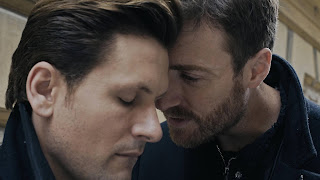Movie Review - Minyan (Outfest 2020)
Directed and co-written by Eric Steel, this film is based on a short story by David Bezmuzgis. It takes place in Brighton Beach in 1986. Brighton Beach is known for having the largest population of Russian immigrants in the country. After World War I, that area saw a wave of Russian immigrants. Many of them were Jewish. After World II, that wave became a lot of Holocaust survivors arriving in New York and settling in Brighton Beach. Steel's film gives us a glimpse into the thoughts, feelings and experiences of those immigrants, especially the older ones who were in fact Holocaust survivors.
Samuel H. Levine is a relatively new actor who has been recognized for his work on the Broadway play called The Inheritance (2019). Here, he stars as David, a young man living with his parents in Brighton Beach. He's possibly still a teenager or college-age. It's clear that he's not yet 21 and legally old enough to drink at a bar. He probably emigrated with his family at an even younger age, but not so young that he can't remember what life was like in Russia. His parents have adapted to life in New York fairly well. His mother works at a dentist's office and his father works at a physical therapist's office.He attends classes at a public school, even though his parents would prefer he attend a Jewish school or only go to the schul. We see that he does spend some time in the Jewish school, learning about his religion and its teachings. Yet, he doesn't seem to like it. His mother worries about David experiencing antisemitism, if he doesn't stay, but David finds a way out of that Jewish school.
Ron Rifkin (Brothers & Sisters and Alias) co-stars as Josef Brodsky, the grandfather to David who used to be a Russian soldier. It's not clear, but it seems as if he and his wife came with David and his parents to America. He's Jewish too and is obviously a very devout man. The film starts off with the death of his wife and the family in mourning. His problem is that he can't live where he is by himself for financial reasons, so he's put on a waiting list for subsidized housing. He's eventually put into the Scheuer House of Brighton Beach, which is run by a rabbi whose approval appears to be a sticking point in order to get Josef or any one a residence there.Yet, the film gets sidetracked with David's relationship with several other people. The first is his relationship with Josef's neighbors in the adjacent apartment. They're two elderly, Russian men who in their lives were a soldier and a poet, named Itzik and Herschel, respectively. Itzik is played by Mark Margolis (Breaking Bad and Oz) and Herschel is played by Christopher McCann (Law & Order and Miami Vice). The other person with whom David has a relationship is a sexy, American bartender named Bruno, played by Alex Hurt. It's not that these relationships are sidetracks, but they feel almost like disparate things, despite being connected.
It's implied but never stated or confirmed that Itzik and Herschel are a couple. It is stated clearly that both of them had wives back in the old country. Both knew each other because their wives were friends. After their wives passed and they came to America, they decided to live together because it was more financially sound. When David visits their apartment, he gets signs and indications that they're more than just roommates. Maybe David wouldn't notice those so-called signs, if he weren't gay himself. Because it's the 1980's and being openly gay isn't as mainstream as it is now, David has learned how to be stealth and subtle, as well as cruise for gay sex without drawing attention to himself. He can therefore read non-verbal signs.When a challenge faces one of those elderly men, David really steps up to help and defend them. David spends some time with them, one scene that we see. It's not clear though why he would help and defend them as passionately as he does. One explanation could be the possible kinship that he shares with them, given that maybe he assumes that they are gay or have same-sex attraction as he does. It's obvious that David is gay in that he pursues a relationship with Bruno and has sex with Bruno several times. The first time he does so it's without a condom or Bruno at no point reaches for a condom, yet later Bruno yells at David about not knowing about the HIV/AIDS epidemic. However, the difficulty that David must recognize with being gay at his age in this city perhaps translates to his empathy for Itzik and Herschel. Yet, that connection isn't made explicitly clear. It's not clear if the two elderly men even realize that David is gay.
Otherwise, I'm not sure what we're supposed to learn or takeaway. Steel could simply be trying to paint a picture of what life was like for a gay man in this time and in this community, a slice of life or coming-of-age story that probably would resonate more for Jewish men, which would be fine. Unfortunately, the film didn't hit me emotionally as one who isn't a Jewish man. Levine gives a very good performance and is entrancing in almost every frame that he's in, so here's hoping that we see more of him, as he could be the next Jonathan Groff.Not Rated but contains nudity and intense sexuality.
Running Time: 1 hr. and 58 mins.
Streamed through OutfestNow.















Comments
Post a Comment